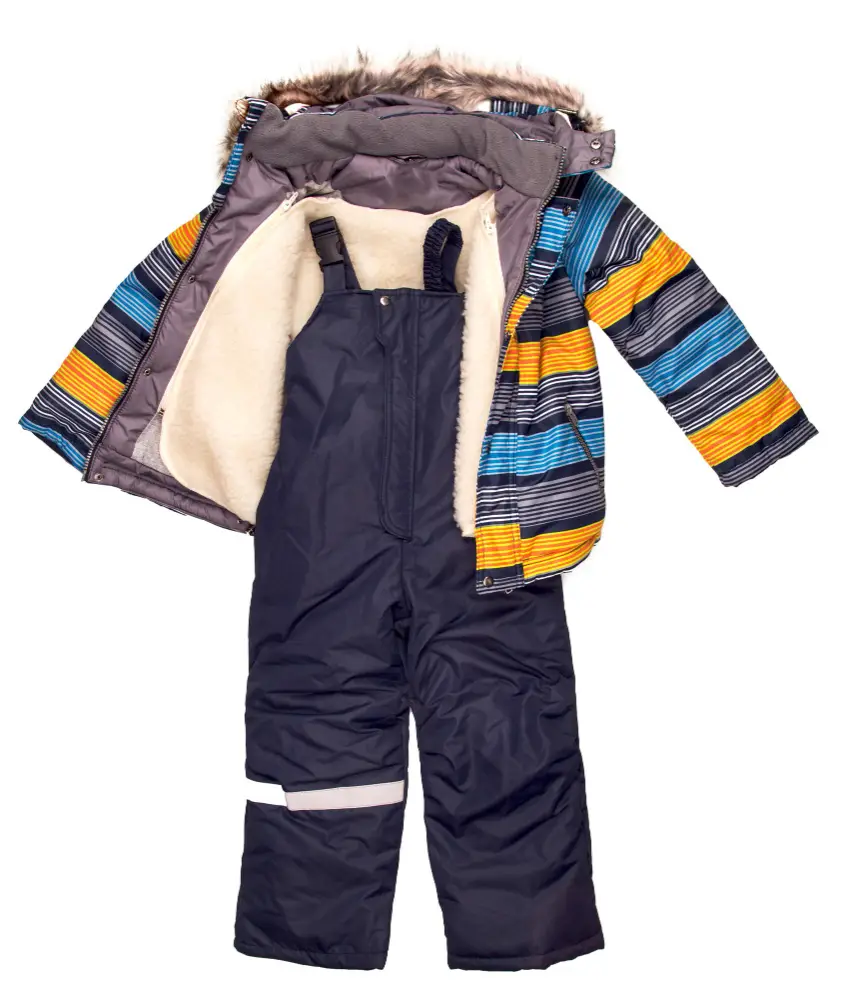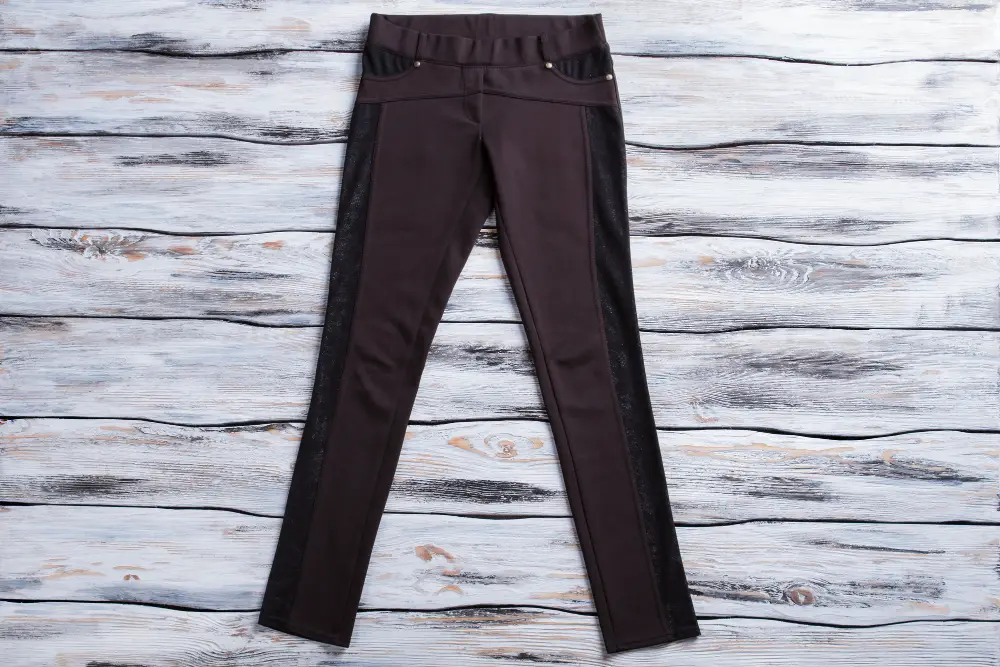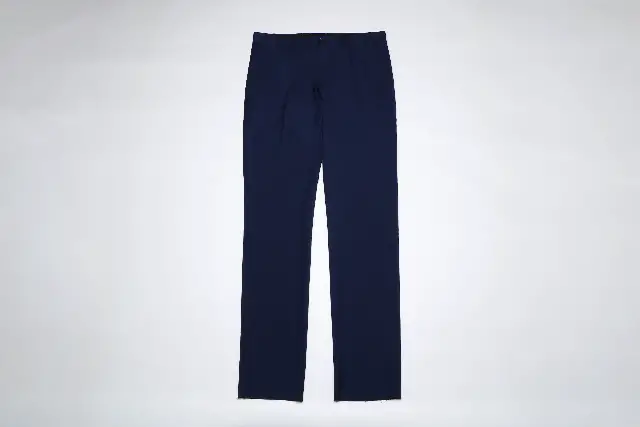Polyester trousers offer durability and wrinkle resistance, but they can trap heat, leading to discomfort. They constitute 50% of global textile production. Their low biodegradability raises environmental concerns, with over 342 million barrels of oil used yearly.
An Overview of the Polyester Fabric
Polyester is a synthetic fiber developed in the 1930s. It is known for its high durability, elasticity, and resistance to shrinkage. It is likewise resistant to most household chemicals, so it can be washed with chlorine bleach or dry-cleaned without significant damage.
While it may seem perfect for clothing materials, polyester also has some drawbacks. It doesn’t breathe well, so people wearing polyester tend to sweat more than those wearing natural fibers like cotton.
Some people find that polyesters don’t fit them very well or make them itch or feel claustrophobic.
Note: Many fabrics are blended with polyester to add features such as wrinkle resistance and stain protection. As you can see, there are pros and cons to everything. The decision is up to you!

Advantages of Polyester Trousers
Polyester trousers are lighter, easier to clean, and cheaper than cotton. They similarly come in a variety of colors and prints. Below are some of their advantages:
They are Durable
Polyester trousers are a good choice if you are looking for something durable. They also dry quickly, which is great for laundry day.
What makes this material durable? It is made from a type of plastic called polyester and is strong because the individual fibers are stitched together tightly. You can imagine what happens when water touches polyester: The stitches break apart, and the water rushes in.
That’s why polyester dries so well; most moisture escapes before you put them in the clothes dryer. Polyesters can withstand more wear and tear than cotton or wool because they don’t have natural flaws like these other fabrics.
Polyester can last long if appropriately treated but has been known to wear out easily with regular use. If cared for well, polyester can last years, while other fabrics will only last a few months before they show signs of wear and tear.
They are Inexpensive
Polyester trousers are usually cheaper than other materials, such as wool or cotton. They often cost less than $100 for a two-piece suit. Some people like them because they’re easy to care for. Others don’t like that they’re not very warm in the winter months.
Depending on what you want from your clothing, polyester may or may not be a good choice for trousers.
The Low cost is because the manufacturing process is inexpensive. However, the manufacturing process is considered by some to be bad for the environment.

Polyester Trousers Are Elastic
Polyester clothing is a form of synthetic fabric that is an artificial material. It can be made from different materials, including polyesters such as polyethylene terephthalate (PET).
The good thing about polyester trousers is that they are elastic, which means they have plenty of stretches to accommodate your body shape. This also means it will not crease or wrinkle as cotton trousers do.
They are more durable than cotton trousers and are also resistant to spills and stains. They can be machine washed, so you don’t have to worry about them shrinking or fading in color with time.
Polyester Trousers Have Moisture-Wicking Abilities
Polyester trousers are often made with moisture-wicking fabric designed to pull moisture away from your skin. This can be a good thing in warmer climates where sweat can make you uncomfortably warm.
This ability benefits your skin as it minimizes chaffing and bacterial infection resulting from blisters. However, by locking in your sweat, polyester trousers may cause chills in colder climates.
Water and Stain Resistant
Polyester trousers can be an excellent option for those in wetter climates. They are water resistant, meaning they won’t soak up the rain as easily as cotton trousers, meaning you’ll stay dryer on your morning commute.
What Promotes the Water-resistance abilities of polyester? Well, the artificial fibers are woven together to create these pants. It does not absorb moisture very well, so if you get caught in an unexpected downpour, these pants will do better than cotton ones.
One of the other good things about polyester is that it is resistant to stains like coffee or red wine, which could come from wearing it during an important business meeting or date night out with friends.
Point to Remember: These pants stretch over time because of spandex or lycra fibers that enhance elasticity and comfort. However, this means they will have to be re-hemmed periodically or go shopping for new pairs more often than someone with regular cotton trousers would need.

Disadvantages of Polyester Trousers
Here are some of the disadvantages of polyester trousers:
Polyester Trousers Lack Breathability
Polyesters are usually made of plastic, which doesn’t allow them to breathe. They do not release heat or sweat due to their material, so they retain all the moisture in your body.
This can cause discomfort and odor during long periods of wear. It is also challenging to clean them because polyesters tend to resist water and often need dry-cleaning treatment. Finally, polyester fibers are sometimes not friendly to the skin.
Polyester is Environmentally Unfriendly
The process of making the polyester fabric releases fuel fossils into the environment. Another problem with polyester is that it does not biodegrade, meaning it will be in a landfill for centuries or longer. Therefore, the material impacts greenhouse gases more than any other fabric.
The Material is Highly Flammable
Polyester is a highly flammable material. Polyester textiles release toxic fumes that can harm your lungs when they catch fire.
When polyesters burn, many dangerous chemicals, such as acrolein, acetaldehyde, and benzene, are released into the air.
- Acrolein is a highly reactive chemical that may irritate the skin, eyes, nose, or throat. If inhaled, it may lead to serious respiratory problems.
- Benzene is considered a known human carcinogen.
- Acetaldehyde irritates the skin but only causes minor eye problems when it comes into contact with them; however, it can be hazardous if inhaled in large quantities because it can lead to vomiting and loss of consciousness.
5 Reasons Why You Should Avoid Wearing Polyester Trousers
The textile industry offers a wide range of materials for consumers to select from, with diverse attributes and applications. One such material, polyester, is commonly used in manufacturing trousers and other clothing items due to its strength, elasticity, and resistance to wrinkles and fading. However, while these characteristics seem appealing at first glance, there are several reasons why you should avoid wearing polyester trousers, which include:
- Non-Breathability:
Polyester is a tightly woven synthetic fabric that hampers airflow to your skin. This non-breathable characteristic may cause discomfort, especially during warmer conditions or physical activities. - May Cause Skin Irritation or Allergies:
Polyester might trigger skin allergies or irritation in individuals who are sensitive to synthetic fabrics. Manifestations include itching, redness, and rashes, making polyester trousers an unsuitable choice for those prone to skin-related issues. - Environmentally Damaging:
The manufacture of polyester involves the use of chemicals that can be harmful to the environment. Moreover, as a kind of plastic, polyester is non-biodegradable and consumes a significant length of time to decompose once discarded. - Increases Body Odour:
Polyester garments like trousers tend not to absorb sweat effectively, thereby retaining body odor more than natural fiber fabric like cotton or linen. This may lead to unpleasant smells, which can be embarrassing and inconvenient. - Heat Sensitivity:
Another factor to consider when wearing polyester trousers is their heat sensitivity. They can become quite hot in warm climates and uncomfortability warm when ironed at high temperatures.
When is the Best Option to Wear Polyester Trousers
The task of fashion is knowing the right clothing to wear at the right time. Polyester trousers are comfortable, durable, and practical for various occasions. Here is a meticulously compiled listicle to guide you on when it’s best to wear them.
1. During Athletic Activities
When it comes to sportswear, polyester has a prized possession. They’re lightweight, moisture-wicking and extremely comfortable. Wearing polyester trousers during athletic activities ensures efficient performance without the hindrance of dampness or additional weight.
2. For Regular Office Wear
If your work requires you to look formal, yet be comfortable for hours on end, polyester trousers are your go-to. They are wrinkle-resistant, easy to maintain, and add that all-important professional touch to your office style.
3. On Cool Evenings
Despite their lightweight nature, polyester trousers possess thermal properties, making them perfect for cool evening walks or movie nights with friends.
4. During Outdoor Adventures
Polyester trousers are a great closet staple for hikers, campers, and outdoor enthusiasts due to their durability and quick-drying features.
5. For Traveling
Traveling requires clothes that are easy to care for and comfortable to wear, and this is precisely where polyester trousers excel in. Their ability to resist wrinkles and quick-drying nature make them ideal travel companions.
Frequently Asked Questions
What Are the Common Uses of Polyester Trousers
Polyester trousers are often used by people who need to have plenty of pockets for items like keys, a wallet, a phone, etc. They are typically made from a lightweight, quick-drying material. This makes them great for constantly on-the-go people or those who often find themselves in wet weather.
The Verdict on Whether Polyester Trousers Are Good or Bad
Polyester trousers are made from synthetic fabrics, which can be good or bad depending on your perspective. For example, polyester is typically used to make wrinkle-resistant clothing, stain-resistant, and easy to care for.
However, this material is also less breathable than natural fabrics like cotton or wool. It can also feel somewhat stiff when you first wear it.
On the other hand, this material is often more durable than natural fabrics because it doesn’t tear and wear as much over time. Plus, it can be dyed to match any color without fading out, as cotton does after repeated washings.
Reference 1: https://siizu.com/blogs/fabric-talk/5-reasons-why-you-should-avoid-wearing-polyester
Reference 2: https://silverbobbin.com/advantages-and-disadvantages-of-polyester/

